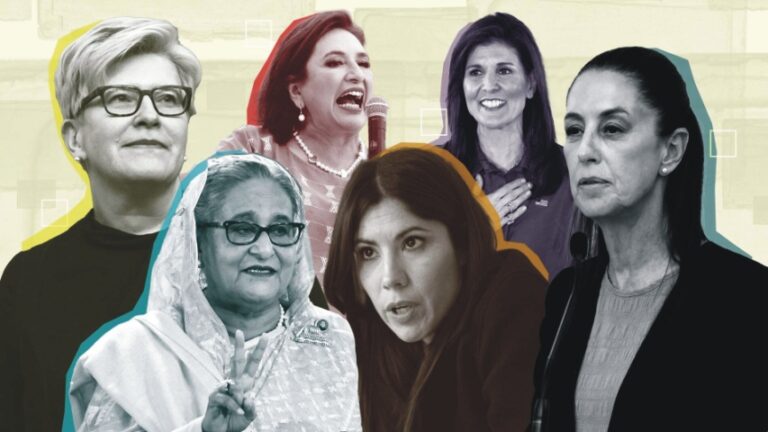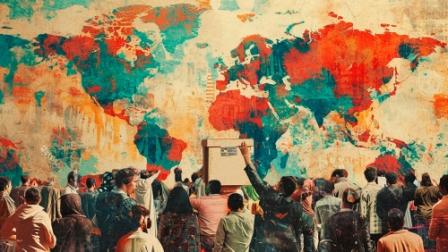
Jonathan Yerushalmy and Ashifa Kassam
WITH MORE PEOPLE set to vote in elections than at any time in history, 2024 is being touted as a test of democracies’ strength around the world, but one thing remains in noticeably short supply – female leadership candidates.
 Analysis from the Guardian shows that of the 42 elections – both presidential and parliamentary – in which the country’s leader is being selected and where candidates have been declared, just 18 have women in the running to be leader. In just a handful of countries do women have a reasonable chance of winning – based on polling averages and the historical results of the parties they are running for.
Analysis from the Guardian shows that of the 42 elections – both presidential and parliamentary – in which the country’s leader is being selected and where candidates have been declared, just 18 have women in the running to be leader. In just a handful of countries do women have a reasonable chance of winning – based on polling averages and the historical results of the parties they are running for.
With a combined population of more than two billion, elections in the world’s biggest democracies – the US, Indonesia and India – have, or had, no female frontrunners. The same is true of votes in the UK, Pakistan and South Africa.

The challenges faced by female politicians are perhaps best exemplified in the United States – the world’s richest country – where female representation in politics still lags behind many other wealthy nations.
Hillary Clinton made history as the first woman to win her party’s nomination in 2016 – while Kamala Harris became the country’s first female vice-president in 2021 – but Republicans had to wait until March 2024 for a woman to win a state primary, with Nikki Haley’s victory in Vermont coming less than 24 hours before she suspended her presidential campaign.

Polling shows that in general, Americans are open to electing a female leader. A 2023 survey from Pew Research found that 53% of the population say there are too few women in high political offices, while 81% accept that female politicians have to do more to prove themselves than their male peers.
Mexico’s first female president
Directly south of the US border, an entirely different dynamic is at play. On 2 June, Mexico will hold an election in which voters are poised to elect a female president for the first time. The historic result was all but guaranteed in September, after former Mexico City mayor Claudia Sheinbaum was selected as the ruling party’s nominee, to face off against centre-right senator Xóchitl Gálvez.

When Sheinbaum and Gálvez entered politics at the start of the millennium, more than 80% of the country’s senators were men. Today the majority are women, a result, analysts say, of a concerted efforts to increase representation.
In 2019, Mexico enshrined parity of representation in its constitution, meaning that if parties fail to field at least 50% female candidates, they can be barred from competing.

Since the 2018 election, more women have won state governorships than in the entire history of the country. Mexico’s parliament now has the joint fourth-highest level of female participation of anywhere in the world.
However, Mexico’s successes when it comes to female representation in politics stand in stark contrast to the broader challenges facing women in the country.
Studies show women remain seriously under-represented in boardrooms, are paid significantly less than their male counterparts and are more likely to work in the informal economy. Mexico also remains mired in gender-based violence, with government data released in 2022 showing an average of 10 women or girls killed daily. ![]()
Courtesy of Guardian News & Media Ltd
__________
Also Read:
Dr. Manmohan Singh: A Hero Shy of His Own Greatness
‘Yahi Hai Mera Mama’ – A commentary on Lok Sabha Elections
AAP under scrutiny; Delving into poetic justice
Three New Criminal Laws – Some Flaws That Are Prone To Gross Misuse And Abuse
Hai, Modi kitna bura hai! (Agreed. But…)
Relax, My dead body won’t trouble your shoulders!
Shilanyas was a mistake, but Rajiv was not aware of unlocking Babri
Disclaimer : PunjabTodayTV.com and other platforms of the Punjab Today group strive to include views and opinions from across the entire spectrum, but by no means do we agree with everything we publish. Our efforts and editorial choices consistently underscore our authors’ right to the freedom of speech. However, it should be clear to all readers that individual authors are responsible for the information, ideas or opinions in their articles, and very often, these do not reflect the views of PunjabTodayTV.com or other platforms of the group. Punjab Today does not assume any responsibility or liability for the views of authors whose work appears here.
Punjab Today believes in serious, engaging, narrative journalism at a time when mainstream media houses seem to have given up on long-form writing and news television has blurred or altogether erased the lines between news and slapstick entertainment. We at Punjab Today believe that readers such as yourself appreciate cerebral journalism, and would like you to hold us against the best international industry standards. Brickbats are welcome even more than bouquets, though an occasional pat on the back is always encouraging. Good journalism can be a lifeline in these uncertain times worldwide. You can support us in myriad ways. To begin with, by spreading word about us and forwarding this reportage. Stay engaged.
— Team PT


Copyright © Punjab Today TV : All right Reserve 2016 - 2024 |